人教版七年级下册 Unit 6 I'm watching TV.Section A Grammar Focus-3c 课件 (共43张PPT)
文档属性
| 名称 | 人教版七年级下册 Unit 6 I'm watching TV.Section A Grammar Focus-3c 课件 (共43张PPT) |  | |
| 格式 | pptx | ||
| 文件大小 | 3.1MB | ||
| 资源类型 | 教案 | ||
| 版本资源 | 人教新目标(Go for it)版 | ||
| 科目 | 英语 | ||
| 更新时间 | 2022-11-23 13:17:55 | ||
图片预览

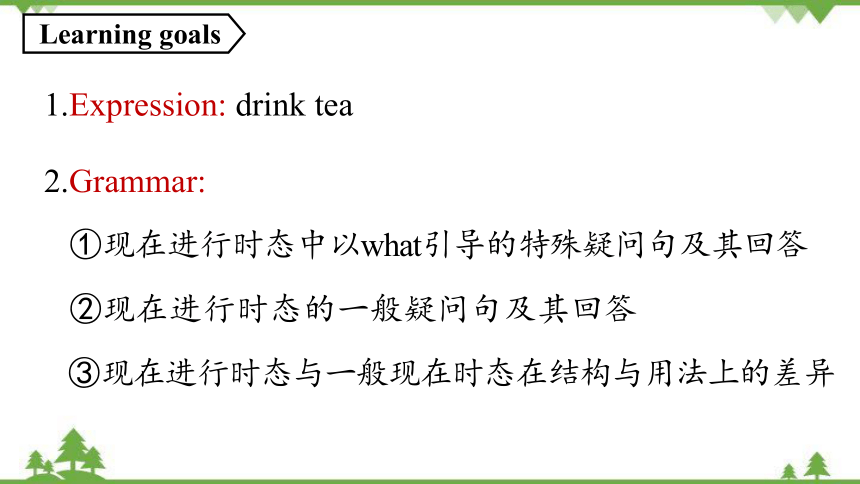
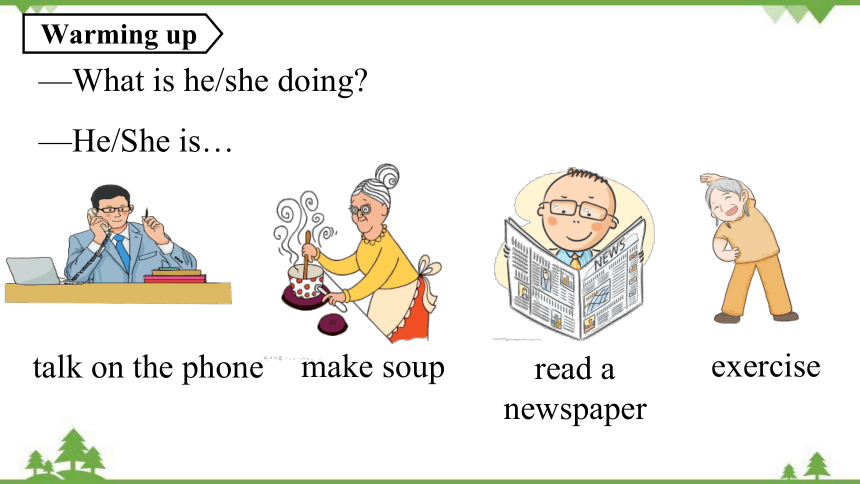
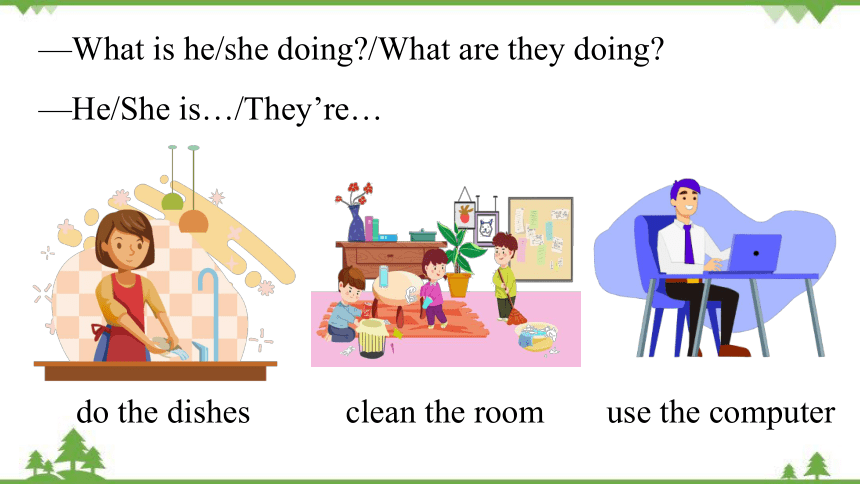
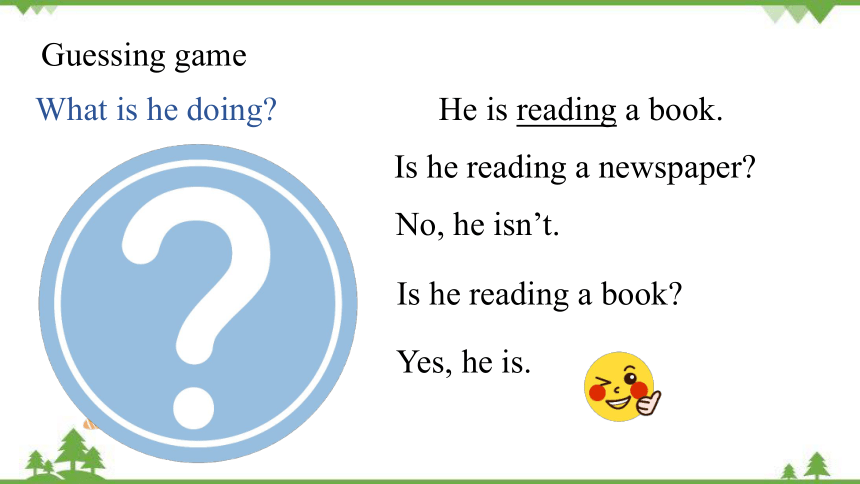
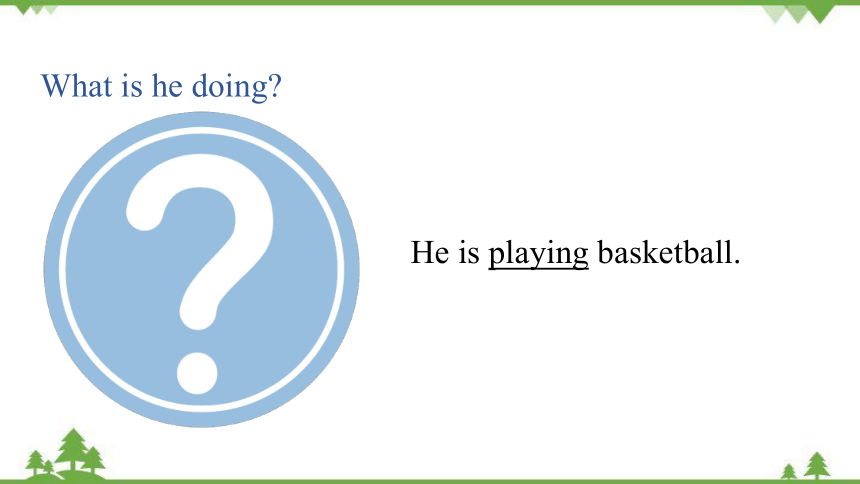
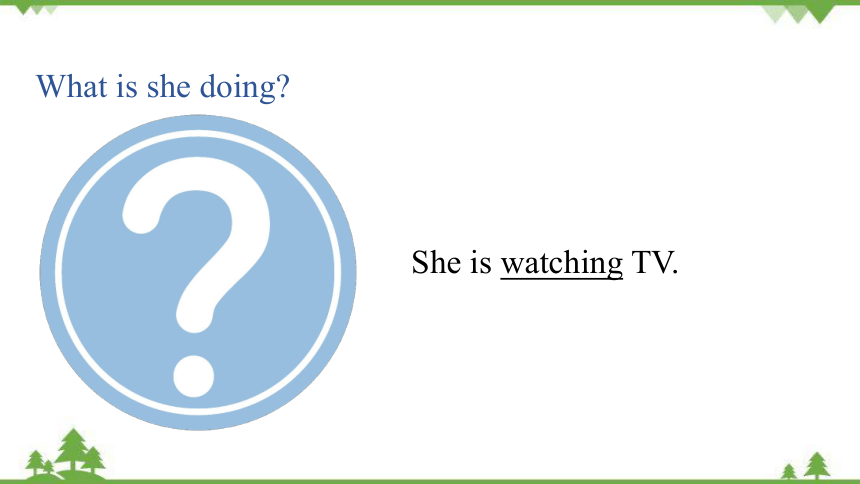
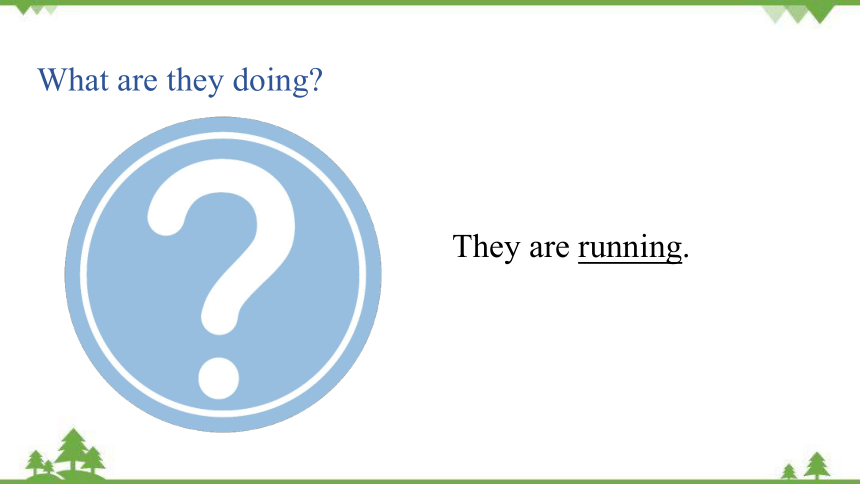
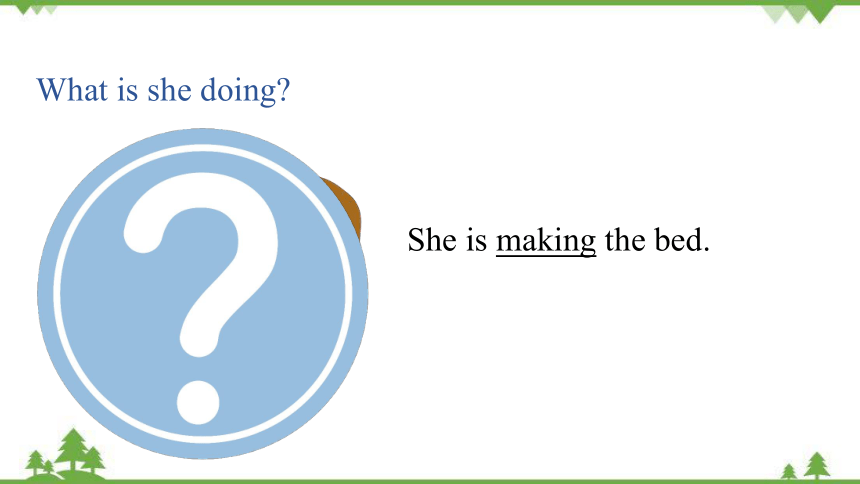
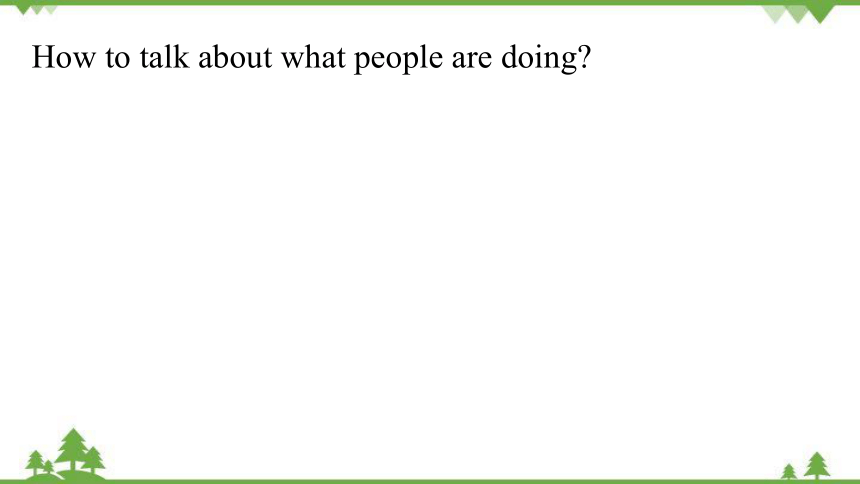
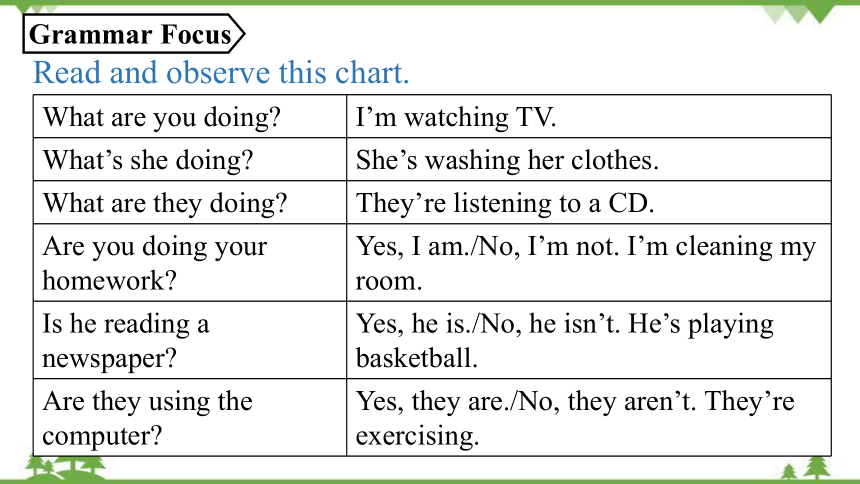
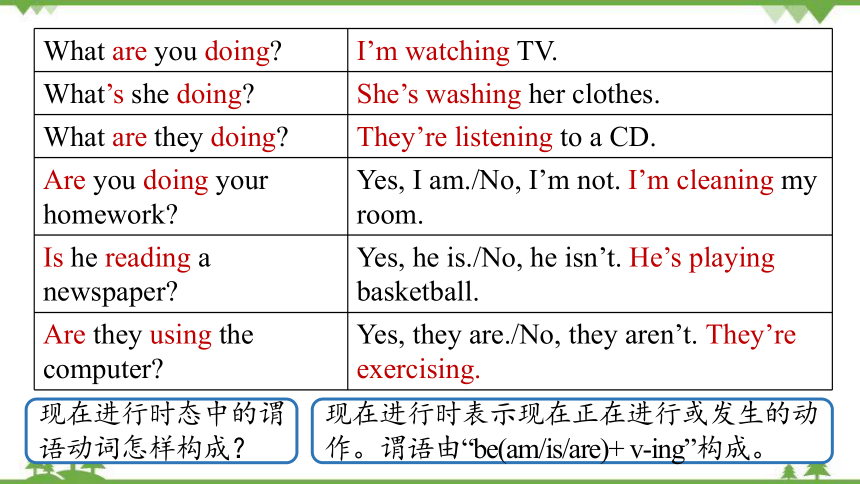
文档简介
(共43张PPT)
Section A Grammar Focus-3c
Unit 6 I’m watching TV.
初中英语
七年级下册 RJ
1.Expression: drink tea
2.Grammar:
①现在进行时态中以what引导的特殊疑问句及其回答
②现在进行时态的一般疑问句及其回答
③现在进行时态与一般现在时态在结构与用法上的差异
Learning goals
—What is he/she doing
—He/She is…
talk on the phone
make soup
read a newspaper
exercise
Warming up
—What is he/she doing /What are they doing
—He/She is…/They’re…
do the dishes
clean the room
use the computer
Guessing game
What is he doing
Is he reading a newspaper
No, he isn’t.
Is he reading a book
Yes, he is.
He is reading a book.
What is he doing
He is playing basketball.
What is she doing
She is watching TV.
What are they doing
They are running.
What is she doing
She is making the bed.
How to talk about what people are doing
What are you doing I’m watching TV.
What’s she doing She’s washing her clothes.
What are they doing They’re listening to a CD.
Are you doing your homework Yes, I am./No, I’m not. I’m cleaning my room.
Is he reading a newspaper Yes, he is./No, he isn’t. He’s playing basketball.
Are they using the computer Yes, they are./No, they aren’t. They’re exercising.
Read and observe this chart.
Grammar Focus
现在进行时态中的谓语动词怎样构成?
现在进行时表示现在正在进行或发生的动作。谓语由“be(am/is/are)+ v-ing”构成。
What are you doing I’m watching TV.
What’s she doing She’s washing her clothes.
What are they doing They’re listening to a CD.
Are you doing your homework Yes, I am./No, I’m not. I’m cleaning my room.
Is he reading a newspaper Yes, he is./No, he isn’t. He’s playing basketball.
Are they using the computer Yes, they are./No, they aren’t. They’re exercising.
动词-ing形式怎样构成?
(1) 一般动词在词尾直接加-ing;
(2) 动词词尾包含不发音的字母e时,去e加-ing。
What are you doing I’m watching TV.
What’s she doing She’s washing her clothes.
What are they doing They’re listening to a CD.
Are you doing your homework Yes, I am./No, I’m not. I’m cleaning my room.
Is he reading a newspaper Yes, he is./No, he isn’t. He’s playing basketball.
Are they using the computer Yes, they are./No, they aren’t. They’re exercising.
现在进行时的肯定句怎样构成?否定句呢?
I am + doing.We/You/They are + doing.
He/She/It is + doing.
否定句在助动词be(am/is/are)后面加not。
What are you doing I’m watching TV.
What’s she doing She’s washing her clothes.
What are they doing They’re listening to a CD.
Are you doing your homework Yes, I am./No, I’m not. I’m cleaning my room.
Is he reading a newspaper Yes, he is./No, he isn’t. He’s playing basketball.
Are they using the computer Yes, they are./No, they aren’t. They’re exercising.
现在进行时的一般疑问句怎样构成?
怎样回答?
一般疑问句把助动词be(am/is/are)提前。肯定回答:Yes, 主语(人称代词) + be.
否定回答:No, 主语(人称代词) + be + not.
What are you doing I’m watching TV.
What’s she doing She’s washing her clothes.
What are they doing They’re listening to a CD.
Are you doing your homework Yes, I am./No, I’m not. I’m cleaning my room.
Is he reading a newspaper Yes, he is./No, he isn’t. He’s playing basketball.
Are they using the computer Yes, they are./No, they aren’t. They’re exercising.
现在进行时的特殊疑问句怎样构成?
怎样回答?
特殊疑问词+be(am/is/are) +主语+ v-ing + 其他 I’m v-ing...He/She/It is v-ing...
They are v-ing...
What are you doing I’m watching TV.
What’s she doing She’s washing her clothes.
What are they doing They’re listening to a CD.
Are you doing your homework Yes, I am./No, I’m not. I’m cleaning my room.
Is he reading a newspaper Yes, he is./No, he isn’t. He’s playing basketball.
Are they using the computer Yes, they are./No, they aren’t. They’re exercising.
现在进行时表示现在(说话瞬间)正在进行或发生的动作,也可表示当前一段时间内的活动或现阶段正在进行的动作。
语法概述
现在进行时
动词-ing形式的变化规则
规则 示例
一般情况下,直接在动词后面加-ing
以不发音的字母e结尾的动词,去掉e,再加-ing
以重读闭音节结尾且末尾只有一个辅音字母的动词,双写这个辅音字母再加-ing
以ie结尾的动词,变ie为y,再加-ing
stand — standing sing — singing
write — writing take — taking
run — running sit — sitting
die — dying lie — lying
现在进行时的构成
句式 结构 例句
肯定句 主语 + be (am, is, are) + v-ing + 其他.
否定句 主语 + be (am, is, are) + not + v-ing + 其他. He isn’t reading the newspaper. 他没在看报纸。
一般 疑问句 Be (Am, Is, Are) + 主语 + v-ing + 其他 肯定回答:Yes, 主语 + be. 否定回答:No, 主语 + be + not.
特殊 疑问句 特殊疑问词 + be (am, is, are) + 主语 + v-ing + 其他 What is she doing 她正在做什么?
Where are we going 我们在往哪里去?
—Are they playing soccer 他们在踢足球吗?
—Yes, they are./ No, they aren’t. 是的,他们在踢。/不,他们没在踢。
He is riding his bike. 他正在骑自行车。
现在进行时的用法
现在进行时的用法
主语在句首,am/is/are跟着走。
现在分词随其后,其他成分不可丢。
表示动作正进行,句中now把时间定。
一般问句如何变,把be提到主语前。
否定式更简单,be后只把not添。
句中提问v-ing,what和be放句首。
现在进行时的使用场合
(1) 当句中有时间状语如now, right now, at the/this moment等时,句子表示现在正在发生的事。
Linda’s brother is watching TV in his bedroom now. 现在琳达的哥哥正在他的卧室里看电视。
What are our parents doing at the moment 我们的父母此刻在干什么呢?
(2) 当句中有these days, this week, this month, this term等时间状语,且句子要表达现阶段正在进行的动作。
These days we are helping the farmers work on the farm. 这些天我们在农场帮农民们干活。
Tom is writing a book this week. 这一周汤姆在写一本书。
(3)句中出现“Look!”“Listen!” “Be quiet!” 等时,说明后面的动作正在发生,应用现在进行时。
Listen! Our English teacher is singing the popular English song. 听!我们的英语老师正在唱那首流行的英文歌曲。
Be quiet! The baby is sleeping. 安静!这个婴儿正在睡觉。
(4)语境暗示句子用现在进行时。
—Where is Mr Wang 王先生在哪里?
—He is reading a newspaper in the office.他正在办公室里看报。
Observe this chart.
Simple Present Tense Present Progressive Tense
I often watch TV. I am watching TV now.
She often watches TV. She is watching TV now.
They often watch TV. They are watching TV now.
Do you often watch TV Are you watching TV now
Simple Present Tense Present Progressive Tense
I often watch TV. I am watching TV now.
She often watches TV. She is watching TV now.
They often watch TV. They are watching TV now.
Do you often watch TV Are you watching TV now
左栏例句中谓语部分的结构与右栏例句的谓语结构有何不同
左栏的谓语动词为do/does(动词原形/动词第三人称单数);
右栏的谓语动词为be(am/is/ are) + v-ing。
Simple Present Tense Present Progressive Tense
I often watch TV. I am watching TV now.
She often watches TV. She is watching TV now.
They often watch TV. They are watching TV now.
Do you often watch TV Are you watching TV now
两栏例句中各使用的时间状语有何不同
左栏的时间状语为often;
右栏的时间状语为now。
Simple Present Tense Present Progressive Tense
I often watch TV. I am watching TV now.
She often watches TV. She is watching TV now.
They often watch TV. They are watching TV now.
Do you often watch TV Are you watching TV now
这两栏例句各表达什么概念?
左栏的一般现在时表示现在的状态,经常的或习惯性的动作;右栏的现在进行时表示现在正在进行或发生的动作。
3a Write sentences following the examples.
1. Jenny/clean the house/now
______________________________
2. Bob/make dinner/every Saturday
______________________________
Jenny is cleaning the house now.
Bob makes dinner every Saturday.
n. 房子
3. Mary’s parents/drink tea/after dinner
______________________________________
4. Bill/talk on the phone/now
______________________________________
5. Becky and Bob/watch TV/on weekends
______________________________________
Mary’s parents drink tea after dinner.
Bill is talking on the phone now.
Becky and Bob watch TV on weekends.
drink v.喝 n.饮料;tea为不可数名词
Make conversations according to the sentences in 3a.
What is Jenny doing
Jenny is cleaning the house now.
Read the sentences in 3b. Think of the right order.
___ Do you want to go tomorrow then
___ OK. See you tomorrow evening!
___ I’m reading a book.
___ Let’s go at seven o’clock.
___ No, this book is really interesting.
___ What are you doing
___ Do you want to go to the movies now
___ Sure, what time
1
/t m r /adv. 在明天 n. 明天;未来
___ Do you want to go tomorrow then
___ OK. See you tomorrow evening!
___ I’m reading a book.
___ Let’s go at seven o’clock.
___ No, this book is really interesting.
___ What are you doing
___ Do you want to go to the movies now
___ Sure, what time
3b Number the sentences in order to make a telephone
conversation. Then practice it with a partner.
1
2
3
4
5
6
7
8
Make your own conversations like 3b. Then act it out with your partner.
What are you doing
I’m...
Do you want to...
No, ...
...
...
3c Take turns miming different activities in your group.
The others in the group guess what the activities are.
1.sing ________ 2.dance ________ 3.leave ________
4.study ________ 5.play ________ 6.write ________
7.come ________ 8.draw ________ 9.take ________
10.paint ________ 11.walk ________ 12.wake ________
13.have ________ 14.visit ________ 15.eat ________
singing
dancing
studying
leaving
writing
playing
coming
drawing
taking
painting
walking
waking
having
visiting
eating
一、写出下列单词的v-ing形式
Exercises
1.Look! The boys ____________ (play) basketball on the
playground.
2.My father ____________ (read) books after dinner.
3.In the morning, Mr. Smith ____________ (get) up at
seven o’clock.
4.Listen! Linda _____________ (sing) in the next room.
5.His brother usually _____________ (do) homework at
school.
are playing
reads
is singing
gets
does
二、用所给动词的正确形式填空
6.They _________ (go) shopping every Friday evening.
7.—What’s Grandpa doing now
— He _____________ (work) in the garden.
8.Her sister _____________ (eat) dinner now.
9.Miss King often _____________ (wash) the dishes in the
evening.
10.On weekends Aunt Beth __________ (walk) with her pet
dog.
go
is working
washes
is eating
walks
1.He is doing his homework. (改为一般疑问句)
______ he ______ his homework
2.She is singing an English song. (对画线部分提问)
______ is she ______
3.Are you reading a newspaper (作肯定回答)
Yes, ______ ______.
三、按要求完成句子(每空一词)
Is doing
What doing
I am
4.He cleans his room every morning. (用now改写句子)
He _______ _______ his room now.
5.David is sleeping in his room. (改为否定句)
David _______ _______ in his room.
is cleaning
isn’t sleeping
Grammar
① 现在进行时态中以what引导
的特殊疑问句及其回答
② 现在进行时态的一般疑问句
及其回答
③ 现在进行时态与一般现在时
态在结构与用法上的差异
Summary
Useful
expression
drink tea
给你的同学打电话,问他/她正在做什么,并告诉对方自己在做什么,而且觉得很无聊;然后问对方想不想去看电影。把你们之间的对话用英语写下来,至少8句话。
These sentences may help you
Hello, ...is speaking.
What are you doing
I’m doing…
Do you want to…
…
Homework
THANKS
谢谢聆听!
Section A Grammar Focus-3c
Unit 6 I’m watching TV.
初中英语
七年级下册 RJ
1.Expression: drink tea
2.Grammar:
①现在进行时态中以what引导的特殊疑问句及其回答
②现在进行时态的一般疑问句及其回答
③现在进行时态与一般现在时态在结构与用法上的差异
Learning goals
—What is he/she doing
—He/She is…
talk on the phone
make soup
read a newspaper
exercise
Warming up
—What is he/she doing /What are they doing
—He/She is…/They’re…
do the dishes
clean the room
use the computer
Guessing game
What is he doing
Is he reading a newspaper
No, he isn’t.
Is he reading a book
Yes, he is.
He is reading a book.
What is he doing
He is playing basketball.
What is she doing
She is watching TV.
What are they doing
They are running.
What is she doing
She is making the bed.
How to talk about what people are doing
What are you doing I’m watching TV.
What’s she doing She’s washing her clothes.
What are they doing They’re listening to a CD.
Are you doing your homework Yes, I am./No, I’m not. I’m cleaning my room.
Is he reading a newspaper Yes, he is./No, he isn’t. He’s playing basketball.
Are they using the computer Yes, they are./No, they aren’t. They’re exercising.
Read and observe this chart.
Grammar Focus
现在进行时态中的谓语动词怎样构成?
现在进行时表示现在正在进行或发生的动作。谓语由“be(am/is/are)+ v-ing”构成。
What are you doing I’m watching TV.
What’s she doing She’s washing her clothes.
What are they doing They’re listening to a CD.
Are you doing your homework Yes, I am./No, I’m not. I’m cleaning my room.
Is he reading a newspaper Yes, he is./No, he isn’t. He’s playing basketball.
Are they using the computer Yes, they are./No, they aren’t. They’re exercising.
动词-ing形式怎样构成?
(1) 一般动词在词尾直接加-ing;
(2) 动词词尾包含不发音的字母e时,去e加-ing。
What are you doing I’m watching TV.
What’s she doing She’s washing her clothes.
What are they doing They’re listening to a CD.
Are you doing your homework Yes, I am./No, I’m not. I’m cleaning my room.
Is he reading a newspaper Yes, he is./No, he isn’t. He’s playing basketball.
Are they using the computer Yes, they are./No, they aren’t. They’re exercising.
现在进行时的肯定句怎样构成?否定句呢?
I am + doing.We/You/They are + doing.
He/She/It is + doing.
否定句在助动词be(am/is/are)后面加not。
What are you doing I’m watching TV.
What’s she doing She’s washing her clothes.
What are they doing They’re listening to a CD.
Are you doing your homework Yes, I am./No, I’m not. I’m cleaning my room.
Is he reading a newspaper Yes, he is./No, he isn’t. He’s playing basketball.
Are they using the computer Yes, they are./No, they aren’t. They’re exercising.
现在进行时的一般疑问句怎样构成?
怎样回答?
一般疑问句把助动词be(am/is/are)提前。肯定回答:Yes, 主语(人称代词) + be.
否定回答:No, 主语(人称代词) + be + not.
What are you doing I’m watching TV.
What’s she doing She’s washing her clothes.
What are they doing They’re listening to a CD.
Are you doing your homework Yes, I am./No, I’m not. I’m cleaning my room.
Is he reading a newspaper Yes, he is./No, he isn’t. He’s playing basketball.
Are they using the computer Yes, they are./No, they aren’t. They’re exercising.
现在进行时的特殊疑问句怎样构成?
怎样回答?
特殊疑问词+be(am/is/are) +主语+ v-ing + 其他 I’m v-ing...He/She/It is v-ing...
They are v-ing...
What are you doing I’m watching TV.
What’s she doing She’s washing her clothes.
What are they doing They’re listening to a CD.
Are you doing your homework Yes, I am./No, I’m not. I’m cleaning my room.
Is he reading a newspaper Yes, he is./No, he isn’t. He’s playing basketball.
Are they using the computer Yes, they are./No, they aren’t. They’re exercising.
现在进行时表示现在(说话瞬间)正在进行或发生的动作,也可表示当前一段时间内的活动或现阶段正在进行的动作。
语法概述
现在进行时
动词-ing形式的变化规则
规则 示例
一般情况下,直接在动词后面加-ing
以不发音的字母e结尾的动词,去掉e,再加-ing
以重读闭音节结尾且末尾只有一个辅音字母的动词,双写这个辅音字母再加-ing
以ie结尾的动词,变ie为y,再加-ing
stand — standing sing — singing
write — writing take — taking
run — running sit — sitting
die — dying lie — lying
现在进行时的构成
句式 结构 例句
肯定句 主语 + be (am, is, are) + v-ing + 其他.
否定句 主语 + be (am, is, are) + not + v-ing + 其他. He isn’t reading the newspaper. 他没在看报纸。
一般 疑问句 Be (Am, Is, Are) + 主语 + v-ing + 其他 肯定回答:Yes, 主语 + be. 否定回答:No, 主语 + be + not.
特殊 疑问句 特殊疑问词 + be (am, is, are) + 主语 + v-ing + 其他 What is she doing 她正在做什么?
Where are we going 我们在往哪里去?
—Are they playing soccer 他们在踢足球吗?
—Yes, they are./ No, they aren’t. 是的,他们在踢。/不,他们没在踢。
He is riding his bike. 他正在骑自行车。
现在进行时的用法
现在进行时的用法
主语在句首,am/is/are跟着走。
现在分词随其后,其他成分不可丢。
表示动作正进行,句中now把时间定。
一般问句如何变,把be提到主语前。
否定式更简单,be后只把not添。
句中提问v-ing,what和be放句首。
现在进行时的使用场合
(1) 当句中有时间状语如now, right now, at the/this moment等时,句子表示现在正在发生的事。
Linda’s brother is watching TV in his bedroom now. 现在琳达的哥哥正在他的卧室里看电视。
What are our parents doing at the moment 我们的父母此刻在干什么呢?
(2) 当句中有these days, this week, this month, this term等时间状语,且句子要表达现阶段正在进行的动作。
These days we are helping the farmers work on the farm. 这些天我们在农场帮农民们干活。
Tom is writing a book this week. 这一周汤姆在写一本书。
(3)句中出现“Look!”“Listen!” “Be quiet!” 等时,说明后面的动作正在发生,应用现在进行时。
Listen! Our English teacher is singing the popular English song. 听!我们的英语老师正在唱那首流行的英文歌曲。
Be quiet! The baby is sleeping. 安静!这个婴儿正在睡觉。
(4)语境暗示句子用现在进行时。
—Where is Mr Wang 王先生在哪里?
—He is reading a newspaper in the office.他正在办公室里看报。
Observe this chart.
Simple Present Tense Present Progressive Tense
I often watch TV. I am watching TV now.
She often watches TV. She is watching TV now.
They often watch TV. They are watching TV now.
Do you often watch TV Are you watching TV now
Simple Present Tense Present Progressive Tense
I often watch TV. I am watching TV now.
She often watches TV. She is watching TV now.
They often watch TV. They are watching TV now.
Do you often watch TV Are you watching TV now
左栏例句中谓语部分的结构与右栏例句的谓语结构有何不同
左栏的谓语动词为do/does(动词原形/动词第三人称单数);
右栏的谓语动词为be(am/is/ are) + v-ing。
Simple Present Tense Present Progressive Tense
I often watch TV. I am watching TV now.
She often watches TV. She is watching TV now.
They often watch TV. They are watching TV now.
Do you often watch TV Are you watching TV now
两栏例句中各使用的时间状语有何不同
左栏的时间状语为often;
右栏的时间状语为now。
Simple Present Tense Present Progressive Tense
I often watch TV. I am watching TV now.
She often watches TV. She is watching TV now.
They often watch TV. They are watching TV now.
Do you often watch TV Are you watching TV now
这两栏例句各表达什么概念?
左栏的一般现在时表示现在的状态,经常的或习惯性的动作;右栏的现在进行时表示现在正在进行或发生的动作。
3a Write sentences following the examples.
1. Jenny/clean the house/now
______________________________
2. Bob/make dinner/every Saturday
______________________________
Jenny is cleaning the house now.
Bob makes dinner every Saturday.
n. 房子
3. Mary’s parents/drink tea/after dinner
______________________________________
4. Bill/talk on the phone/now
______________________________________
5. Becky and Bob/watch TV/on weekends
______________________________________
Mary’s parents drink tea after dinner.
Bill is talking on the phone now.
Becky and Bob watch TV on weekends.
drink v.喝 n.饮料;tea为不可数名词
Make conversations according to the sentences in 3a.
What is Jenny doing
Jenny is cleaning the house now.
Read the sentences in 3b. Think of the right order.
___ Do you want to go tomorrow then
___ OK. See you tomorrow evening!
___ I’m reading a book.
___ Let’s go at seven o’clock.
___ No, this book is really interesting.
___ What are you doing
___ Do you want to go to the movies now
___ Sure, what time
1
/t m r /adv. 在明天 n. 明天;未来
___ Do you want to go tomorrow then
___ OK. See you tomorrow evening!
___ I’m reading a book.
___ Let’s go at seven o’clock.
___ No, this book is really interesting.
___ What are you doing
___ Do you want to go to the movies now
___ Sure, what time
3b Number the sentences in order to make a telephone
conversation. Then practice it with a partner.
1
2
3
4
5
6
7
8
Make your own conversations like 3b. Then act it out with your partner.
What are you doing
I’m...
Do you want to...
No, ...
...
...
3c Take turns miming different activities in your group.
The others in the group guess what the activities are.
1.sing ________ 2.dance ________ 3.leave ________
4.study ________ 5.play ________ 6.write ________
7.come ________ 8.draw ________ 9.take ________
10.paint ________ 11.walk ________ 12.wake ________
13.have ________ 14.visit ________ 15.eat ________
singing
dancing
studying
leaving
writing
playing
coming
drawing
taking
painting
walking
waking
having
visiting
eating
一、写出下列单词的v-ing形式
Exercises
1.Look! The boys ____________ (play) basketball on the
playground.
2.My father ____________ (read) books after dinner.
3.In the morning, Mr. Smith ____________ (get) up at
seven o’clock.
4.Listen! Linda _____________ (sing) in the next room.
5.His brother usually _____________ (do) homework at
school.
are playing
reads
is singing
gets
does
二、用所给动词的正确形式填空
6.They _________ (go) shopping every Friday evening.
7.—What’s Grandpa doing now
— He _____________ (work) in the garden.
8.Her sister _____________ (eat) dinner now.
9.Miss King often _____________ (wash) the dishes in the
evening.
10.On weekends Aunt Beth __________ (walk) with her pet
dog.
go
is working
washes
is eating
walks
1.He is doing his homework. (改为一般疑问句)
______ he ______ his homework
2.She is singing an English song. (对画线部分提问)
______ is she ______
3.Are you reading a newspaper (作肯定回答)
Yes, ______ ______.
三、按要求完成句子(每空一词)
Is doing
What doing
I am
4.He cleans his room every morning. (用now改写句子)
He _______ _______ his room now.
5.David is sleeping in his room. (改为否定句)
David _______ _______ in his room.
is cleaning
isn’t sleeping
Grammar
① 现在进行时态中以what引导
的特殊疑问句及其回答
② 现在进行时态的一般疑问句
及其回答
③ 现在进行时态与一般现在时
态在结构与用法上的差异
Summary
Useful
expression
drink tea
给你的同学打电话,问他/她正在做什么,并告诉对方自己在做什么,而且觉得很无聊;然后问对方想不想去看电影。把你们之间的对话用英语写下来,至少8句话。
These sentences may help you
Hello, ...is speaking.
What are you doing
I’m doing…
Do you want to…
…
Homework
THANKS
谢谢聆听!
同课章节目录
- Unit 1 Can you play the guitar?
- Section A
- Section B
- Unit 2 What time do you go to school?
- Section A
- Section B
- Unit 3 How do you get to school?
- Section A
- Section B
- Unit 4 Don't eat in class.
- Section A
- Section B
- Unit 5 Why do you like pandas?
- Section A
- Section B
- Unit 6 I'm watching TV.
- Section A
- Section B
- Review of Units 1-6
- Unit 7 It's raining!
- Section A
- Section B
- Unit 8 Is there a post office near here?
- Section A
- Section B
- Unit 9 What does he look like?
- Section A
- Section B
- Unit 10 I'd like some noodles.
- Section A
- Section B
- Unit 11 How was your school trip?
- Section A
- Section B
- Unit 12 What did you do last weekend?
- Section A
- Section B
